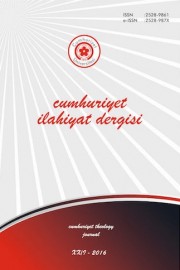Edebiyatımızda Çok Bilinmeyen Bir Tür: Rûznâme ve Bir Rûznâme Örneği
A Literary Genre Unknown Sufficiently in the Turkish Literature: Rūznāme and An Example
Author(s): Alim YıldızSubject(s): Poetry, Theology and Religion, Turkish Literature
Published by: Cumhuriyet Üniversitesi İlahyat Fakültesi
Keywords: Turkish Literature; Masnavīs; Malhama; Rūznāma
Summary/Abstract: The word of rūznāme means diary in the Persian language. In the historical records it refers to special diaries written by the secret clerks of Ottoman sultans. Apart from that there are various different types of rūznāmes. In some rūznāmes were described repetitious behaviors that they are a suitable or an unsuitable for each day of the week or month. This article aims to investigate a manuscript named “The Book of Rūznāme” contains suitable and unsuitable behaviors for each day of month.SUMMARY: The word of ‘rūznāme’ which is formed of rūz, meaning day and nāme, meaning letter, booklet and book in Persian; is a very rich and comprehensive word, meaning a kind of notebook in which incomes and outcomes, adventural events written in and diary, daily newspaper, calender and actuality. When it comes to its usage, we face two scientific fields as history and literature. The documents, written by Ottoman sultans’ sacred writers about his activities during the day, are important for historical sciences; the documents which contain some guesses about whether a planned activity in days of any one of 12 months is good or not, are important for literal sciences in meaning. In literal rūznāme, because the main purpose is bringing news about future, these texts can be seen as fortune books. In Turkısh literatüre, the texts written on this subjects are very few. So, every text in the kind of rūznāme is very important in literal area. This text, which our article is about, is a little poem, formed 58 verses written in the system of masnawi. After the verses in which gratefulness for Allah and salavat for His Prophet were said, the main subject came in the text. After this entrance, composed of six verses, the characteristics of days from the first of them to thirtiest one were said and some recommendations/warnings about doing something on these days were given under the title of ‘ Bāb…Gün’. In the text, the characteristics of days were explained in two verses generally. Besides, it is seen that some days were explained in one verse, another day was explained in three verses and another day was expalined in four verses. It is expressed that from 30 days ordered regularly, 18 of them are auspicious, 8 of them are inauspicious, 4 of them are auspicious for some works and inauspicious for some others. For example it was said that getting married, shopping, travelling are good on the 14th day of the month and it is necessary to plant a tree and to demand for something. But it was expressed that a baby boy, borned in the 16th day of the .onth would be unhealthy, it is necessary to give blood for health and to avoid doing any work in this day. In this article some information is given about ruzname which is a fortune-based literal text and a sample of ruzname in the text between the pages of 8a-10a in the magazine, registered with the number of 213 in Suleymaniye Library, Halet Efendi Part, has been offered to scientific area.
Journal: Cumhuriyet İlahiyat Dergisi
- Issue Year: 20/2016
- Issue No: 1
- Page Range: 429-444
- Page Count: 16
- Language: Turkish

